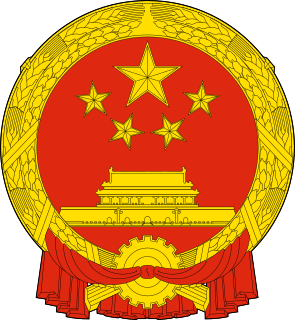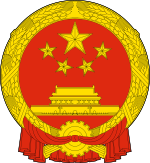
The Central Military Commission (CMC) refers to the parallel national defense organizations of the Communist Party of China and the People's Republic of China: the Central Military Commission of the Communist Party of China, a Party organ under the CPC Central Committee, and the Central Military Commission of the People's Republic of China, a central state organ under the National People's Congress, being the military branch of the national government.

The Ministry of Foreign Affairs of the People's Republic of China under the State Council of the Government of the People's Republic of China is an executive agency responsible for foreign relations between the People's Republic of China and other countries in the world. The agency is led by the Foreign Minister. The current minister is Wang Yi. The agency has its headquarters in Chaoyang District, Beijing.
The People's Liberation Army General Staff Department is the former command organ and the headquarters for the People's Liberation Army (PLA) of China. It was under the absolute leadership of the Central Military Commission. Its duties included PLA Operations Command, Recruitments, Mobilizations, Formation, Trainings and Administration. The PLA General Staff Headquarters was located in Beijing and its last commander was General Fang Fenghui.

The Ministry of National Defence of the People's Republic of China or for short the "National Defence Ministry" is the 2nd-ranked ministry under the State Council. It is headed by the Minister of National Defence. The MND was set up according to a decision adopted by the 1st Session of the 1st National People's Congress in 1954. In contrast to practice in other nations, the MND does not exercise command authority over the People's Liberation Army (PLA), which is instead subordinate to the Central Military Commission (CMC). Instead, the MND itself only serves as liaison body representing the CMC and PLA when dealing with foreign militaries in military exchange and cooperation.
General Office of the State Council of the People's Republic of China is an administrative agency of the State Council which assists the leaders with the day to day administrative operations of the Chinese government.
Fu Zhenghua is a Chinese public security official. In March 2013, Fu has served as the Deputy Minister of Public Security (minister-level) and Deputy Communist Party Secretary of the Ministry of Public Security. Since 2015, Fu has served concurrently as the head of the 610 Office. He was also appointed as the Minister of Justice in 2018.

Armenian-Chinese relations are the foreign relations between Armenia and China. The first references to Armenian-Chinese contact are found in the works of 5th-century historian Moses of Chorene and 6th-century geographer and mathematician Anania Shirakatsi. The People’s Republic of China officially recognized the Republic of Armenia on December 27, 1991. Diplomatic relations between the Republic of Armenia and the People’s Republic of China were established on April 6, 1992. The Embassy of China to Armenia was established in July 1992, while the Embassy of Armenia to China started its activities on August 10, 1996. The Armenian Ambassador to China resides in the Beijing embassy.
Order of Liberation was a Chinese military award awarded to heroes of the Liberation of mainland China during the Second Chinese Civil War between 3 September 1945 and 30 June 1950. There are three grades: First Class Medal, Second Class Medal, and Third Class Medal.

The Li Keqiang Government is the Central People's Government of China from 2013. Premier Li Keqiang took office on 15 March 2013. It succeeded the Wen Jiabao government. Premier Li is ranked only second to Party general secretary Xi Jinping among 7 members of the 18th and 19th Politburo Standing Committee, top decision-making body of the Communist Party of China.

Li Zhimin (李志民 or 李凤瑞 or 李明阶; pinyin:Lǐ Zhìmín or Lǐ Fèngruì or Lǐ Míngjiē; July 9, 1906 – November 16, 1987), was a general of the People's Liberation Army from Liuyang, Hunan. Li was the former political commissar and director for the Political Department of the Chinese People's Volunteers. Li was an outstanding political leader in the PLA.
Luo Guibo (1907–1995) was a Chinese diplomat and People's Republic of China politician. He was born in Nankang County, Jiangxi. He joined the Communist Party of China in 1927. During the Second Sino-Japanese War, he was a general officer in the Eighth Route Army. Luo served as director of the Administrative Office of the CCP Military Affairs committee, and in January 1950 was sent to Vietnam as liaison to Ho Chi-Minh. He was the first Ambassador of China to North Vietnam (1954–1957).
Li Ligong is a People's Republic of China politician. He was born in Jiaocheng County, Lüliang, Shanxi. He was Communist Party of China Committee Secretary of his home province (1983–1991) and political commissar of the People's Liberation Army Shanxi Military District (1983–1985). He was a member of the 12th Central Committee of the Communist Party of China (1982–1987) and 13th Central Committee of the Communist Party of China (1987–1992). He was a delegate to the 7th National People's Congress (1988-1993) and 8th National People's Congress (1993–1998).

Guo Tianmin was a general in the People's Liberation Army of the People's Republic of China from Hubei. He was a descendant of the Tang dynasty general Guo Ziyi.

The constitutional oath of office of China was implemented on January 1, 2016 through a decision by the Standing Committee of the National People's Congress of China. The oath requirement applies to state civil servants elected or appointed by the National People's Congress and its Standing Committee at or above the county level.

Liu Zhen , or Liu You'an (刘幼安), was a general in the Chinese People's Liberation Army.

The Ministry of Culture and Tourism is a ministry of the State Council of the People's Republic of China which is responsible for cultural policy and activities and tourism in the country. Its headquarters are in Chaoyang District, Beijing. It was formed on 19 March 2018; its predecessors were the Ministry of Culture and China National Tourism Administration.

The Ministry of Natural Resources is a ministry of the government of the People's Republic of China which is responsible for natural resources in the country. It was formed on 19 March 2018, taking on the responsibilities of the now-defunct Ministry of Land and Resources, State Bureau of Surveying and Mapping and State Oceanic Administration, with additional responsibilities coming from other departments and ministries.

The Ministry of Agriculture and Rural Affairs is a ministry of the government of the People's Republic of China which is responsible for agriculture and rural affairs in the country. The ministry is headquartered in Beijing. It was formed on 19 March 2018 as a replacement for its predecessor, the Ministry of Agriculture. Some of its additional responsibilities come from the agricultural investment projects of the National Development and Reform Commission, the Ministry of Finance, the Ministry of Land and Resources, and the Ministry of Water Resources.

The National Health Commission of the People's Republic of China is a cabinet-level department of the State Council of the People's Republic of China which is responsible for sanitation and health in the country. It was formed on 19 March 2018. The ministry is headquartered in Beijing. Ma Xiaowei is the current director and Party Branch Secretary. Its predecessor was the National Health and Family Planning Commission.














